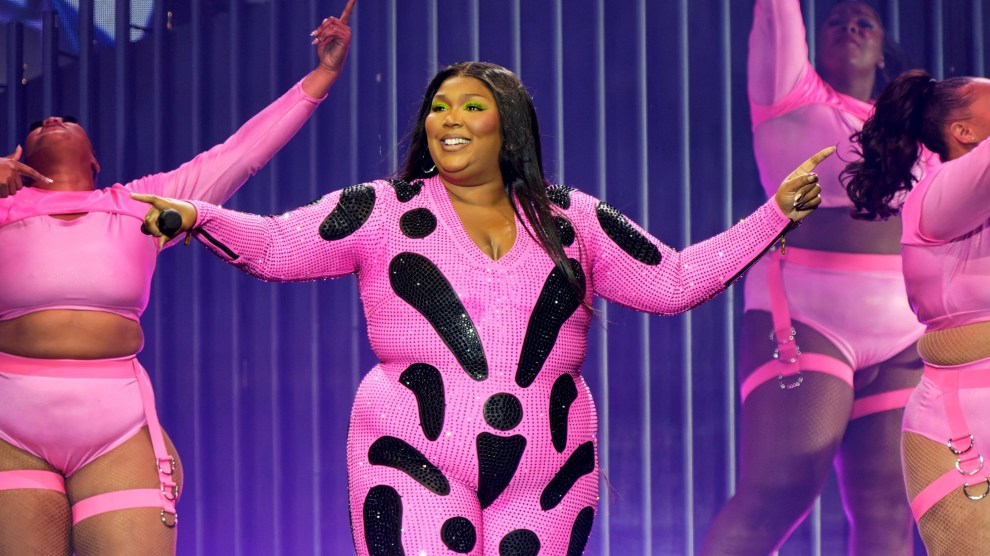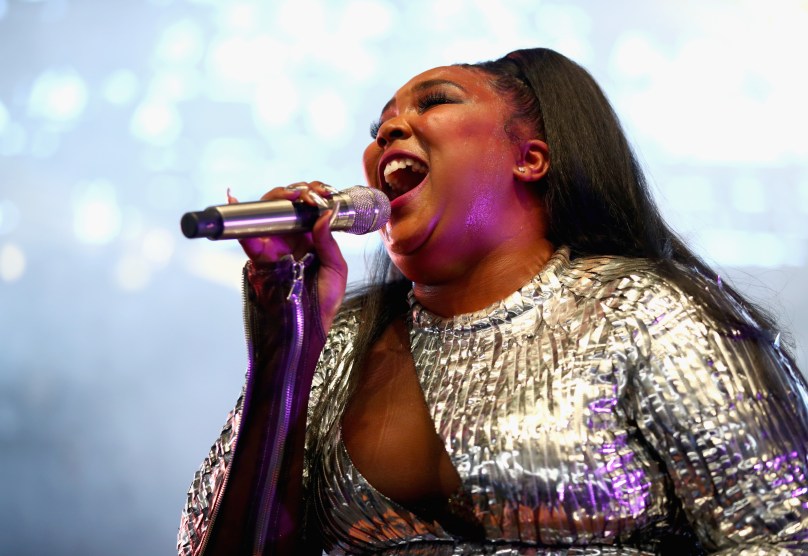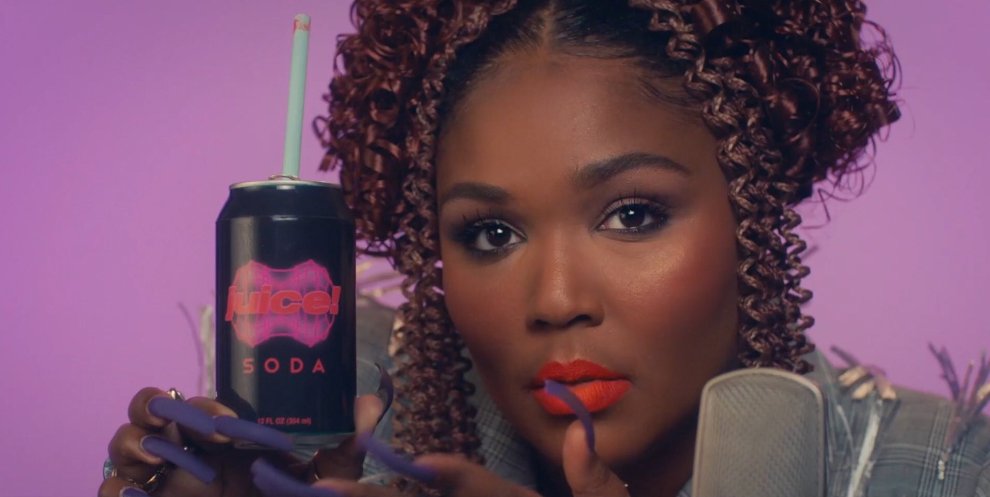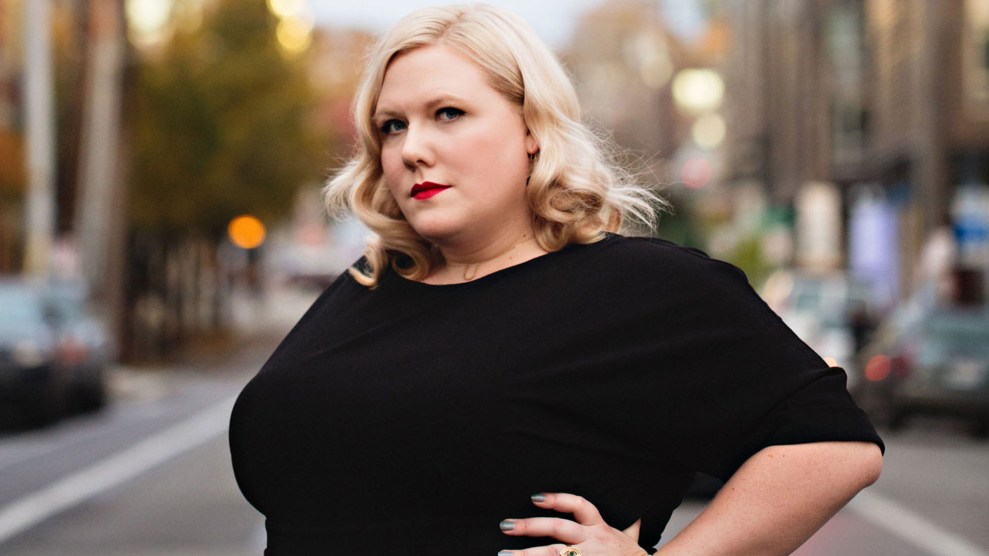
Rob Grabowski/AP
On Tuesday, Lizzo was hit with a lawsuit from three of her former dancers, who allege that they faced a hostile work environment while employed by the singer. The suit, which also names Lizzo’s production company and her dance captain Shirlene Quigley, includes numerous complaints about sexual, racial, religious, and disability harassment, as well as assault.
The news is particularly disappointing for fans of Lizzo, given her purported commitment to social justice issues and to empowering plus-size women of color. Prior to the suit, Lizzo was outspoken against racism, publicly criticized anti-abortion and anti-trans laws, and made headlines for clapping back at trolls who fat-shamed her. Two of the plaintiffs, Arianna Davis and Crystal Williams, were hired in 2021 through Lizzo’s Emmy-winning Amazon Prime show Watch Out For The Big Grrrls, a competition show in which winners got jobs dancing in her tour. Like Lizzo’s dancers, the contestants were all plus-size, and many were women of color. Their journeys to self-acceptance provided key plot lines for the series. “Girls that look like me don’t get representation,” Lizzo said in the series’ trailer. “Time to pull up my sleeves and find them myself.”
For those of us outside the industry, it’s easy to get swept up in thinking of the entertainment world as a realm of art, not commerce. But if this summer of strikes has taught us anything, it’s that entertainment isn’t distinct from any other industry when it comes to the politics of labor. And while Lizzo may have championed inclusive values in public, it’s important to remember that, like many celebrities, the singer is not just a personal brand; she’s also an employer. In the lawsuit, she is named or included in five of the nine complaints. The plaintiffs claim that the singer and her production company put dancers in a precarious financial position by leaving them on “soft hold” between shows. This means if they accepted other jobs they would risk losing employment with Lizzo, despite not being paid for these breaks, which could last for months at a time. While they eventually negotiated a retainer at 50 percent of their salaries, on par with what musicians on the tour were already receiving, the suit says the dancers, many of whom were plus-size women of color, felt increased tension with management after negotiations.
According to the suit, Lizzo also crossed personal boundaries with her dancers. At least twice she took them to see nude performances during after-show excursions that were not technically mandatory, but were widely viewed as necessary to curry favor and ensure future employment. During one interactive performance, she allegedly pressured dancers to touch the performers by grabbing their breasts and eating bananas out of their vaginas. The suit also claims Lizzo failed to protect dancers from religious harassment by dance captain Shirlene Quigley, who allegedly preached about her Christian faith to dancers, inappropriately probing their personal lives, judging them for their sexual pasts, and oversharing about her own sex life. Arguably the most disturbing allegation is the assault claim: Dancers say they feared for their physical safety when Lizzo lashed out at one dancer, Noelle Rodriguez, who resigned because of how Lizzo handled a work conflict. The suit says that the singer approached Rodriguez, “cracking her knuckles, balling her fists, and exclaiming, ‘You’re lucky. You’re so f—ing lucky!’” Rodriguez “feared that Lizzo intended to hit her and would have done so if one of the other dancers had not intervened.”
At the moment of writing this, Lizzo hasn’t addressed the accusations. Without comment, it’s impossible to judge exactly how sincerely she believes in the values she professes and how she squares those values with her alleged behavior. Yet the suit can’t help but bring a hollow ring to her previous calls for representation. Lizzo’s fair treatment of her workers should be a precondition for her representational politics, and a failure of one marks the failure of the other.
Representation is powerful. It can impact mental health, change career paths, and, if done wrong, retrench preexisting prejudices. But representation on its own isn’t enough; it needs to be paired with systemic transformation. If the goal of diversity in pop culture is to expand our social imagination, then there needs to be real-life change to make spaces welcoming for marginalized people. Otherwise, it’s purely symbolic.
I actually enjoyed Watch Out For The Big Grrrls when it first premiered. I liked seeing bodies outside the Kardashian-Jenner mould, watching women follow their dreams, and the idea that Lizzo could represent a new vision for who could be a pop star. More than anything, I’d love to believe it was reality. Looking back now, it feels more like a fantasy.
Update, August 3: Lizzo released a statement denying the allegations. “Usually, I choose not to respond to false allegations, but these are as unbelievable as they sound and too outrageous to not be addressed,” she wrote. She described the former dancers who brought these allegations as “former employees who have already publicly admitted that they were told their behavior on tour was inappropriate and unprofessional.”

















